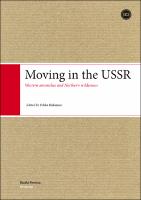Moving in the USSR
Western anomalies and Northern wilderness
Abstract
"This book deals with 20th century resettlements in the western areas of the former USSR, in particular the territory of Karelia that was ceded by Finland in the WWII, Podolia in the Ukraine, and the North-West periphery of Russia in the Kola peninsula. Finns from Karelia emigrated to Finland, most of the Jews of Podolia were exterminated by Nazi Germany but the survivors later emigrated to Israel, and the sparsely populated territory beyond the Polar circle received the Societ conquerors of nature which they began to exploit. The empty areas were usually settled by planned state recruitment of relocated Soviet citizens, but in some cases also by spontaneous movement. Thus, a Ukrainian took over a Jewish house, a Chuvash kolkhos was dispersed along Finnish khutor houses, and youth in the town of Apatity began to prefer their home town in relation to the cities of Russia.
Everywhere the settlers met new and strange surroundings, and they had to construct places and meanings for themselves in their new home and restructure their local identity in relation to their places of origin and current abodes. They also had to create images of the former inhabitants and explanations for various strange details they preceived around themselves.
All articles within this volume are based on extensive field or archive work. This research project was funded by the Academy of Finland."
Keywords
migration; demography; internal migration; colonisation; resettlement activities; regional identity; Soviet UnionDOI
10.21435/sfh.10ISBN
9789517466950; 9789518580235; 9789518580228OCN
1051775707Publisher
Finnish Literature Society / SKSPublication date and place
Helsinki, 2005Series
Studia Fennica Historica, 10Classification
Biography, Literature and Literary studies
Social and cultural anthropology


 Download
Download